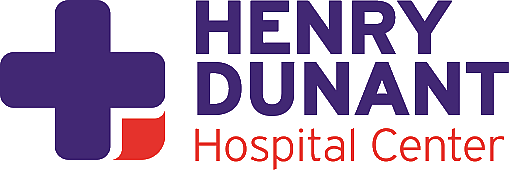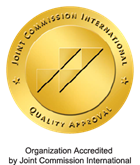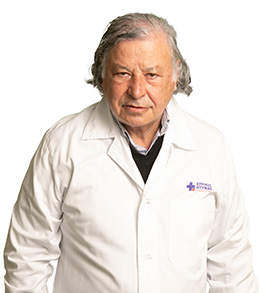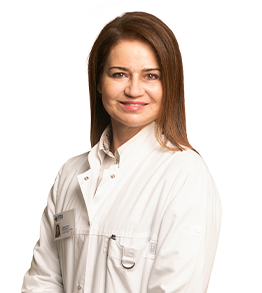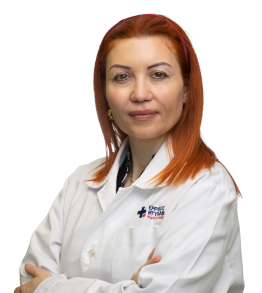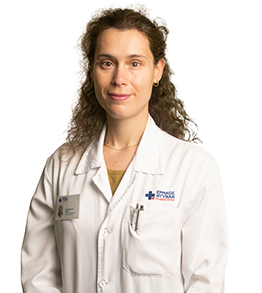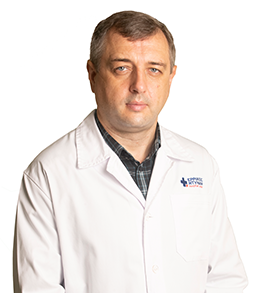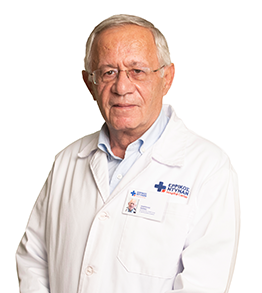
2nd Clinic of Neurology
The 2nd Clinic of Neurology covers the entire range of neurological diseases and disorders of the central and peripheral nervous system both on an emergency or outpatient basis. During emergency treatment, internationally approved diagnostic and therapeutic interventions are performed for cerebrovascular accidents (CVAs) including thrombolysis, thrombectomy and embolization techniques in collaboration with other highly specialized therapeutic and diagnostic teams of our hospital. We also effectively treat acute epilepsy, migraine, confusional, comatose state syndromes, headaches, polyneuropathies, myasthenia seizures, vertigo, and CNS infections. Chronic neurological diseases are investigated and treated in the Outpatient Neurology Clinic, demyelinating diseases in the Specialised Sclerosis Clinic and memory disorders and dementia syndromes in the Specialised Memory Clinic. The medical staff of the Clinic has a high level of experience, expertise and research work, particularly in neuroimmunology, neurodegenerative diseases, neurophysiology and vascular strokes.
Telephone: (+30)210-6979038
Call Center: (+30)210-6972000
Email: b.neurologikodpt@dunant.gr
Director: Kilindireas Constantinos, Giannopoulou Constantina
Activities
Inpatients are fully investigated with the help of laboratories and the hospital’s advanced radiology department, while in treatment, strong support is provided in urgent neurological cases by the Emergency Department, the Intensive Care Unit, the Interventional Neuroradiology Department, and the clinics of Neurosurgery, Pathology, and Cardiology.
- General Clinic of Neurology
In The General Neurology Outpatient Clinic chronic neurological cases are investigated and receive specialized consultation and treatment.
In addition, botulinum toxin injections are given in the appropriate headache, spasticity and dystonia syndromes.
- Special Memory Clinic - Scientific Director K.G. Giannopoulou
Aims to:
- Diagnose in time any form of dementia
- Identify the cause of any memory disorder
- Provide appropriate guidance in each case
Operation
- NEUROLOGICAL ASSESSMENT
- NEUROPSYCHOLOGICAL TESTS - FULL NEUROPSYCHOLOGICAL EVALUATION –
Scientific Director Athanasia Liozidou
- LABORATORY AND IMAGING INVESTIGATION
- GENETIC TESTING
- NURSING of cases requiring further investigation (lumbar puncture for identification of biomarkers in cerebrospinal fluid, percutaneous puncture, other specialised tests)
- THERAPEUTIC INTERVETNIONS:
- NON PHARMACEUTICAL INTERVENTIONS
-Counselling for sufferers, carers, family
-Mental empowerment classes
- PHARMACEUTICAL INTERVENTIONS according to international guidelines
- Liaison with Social Services - ATTESTATIONS FOR ATTENDANCE ALLOWANCE
- LEGAL CAPACITY DOCUMENTATION
- PATIENT PARTICIPATION IN ALZHEIMER’S DISEASE RESEARCH TREATMENT PROTOCOLS
- Special Sclerosis Clinic - Scientific Director Professor K. Kylintireas
Diagnosis and follow-up of patients with demyelinating diseases: Multiple Sclerosis and its rare forms (tuberous demyelination, Neuromyelitis optica, MOG antibody demyelination, Pediatric MS). In addition, the MS Mimickers are clearly defined.
A neurological examination is performed by Professor K. Kylintireas alongside a complete radiology and immunology investigation.
Patients are referred for hospitalisation
- for lumbar puncture
- for treatment with monoclonal antibodies
- when requiring immunosuppressive treatment
- in case of relapses resistant to corticosteroids or neuromyelitis optica requiring plasmapheresis - in collaboration with the haematology clinic
- in case of relapse of the disease for intravenous cortisone administration
Equipment
Neurophysiology Laboratory - Scientific Director Professor Thomas Zampelis
Α. Electromyography (EMG): Peripheral nervous system diseases, myopathies, anterior cervical lesions are investigated by measuring conduction velocities and electromyographic testing as well as myasthenia and other neuromuscular contraction diseases by repetitive nerve stimulation (Desmedt) and individual muscle fibre study (Jitter).
- Electroencephalography (EEG): Epileptic syndromes and consciousness disorders are studied in outpatients, inpatients, and ICU patients. The diagnostic procedure is performed and supervised by the Consultant Anastasia Kaminioti, who has received further training in this field.
